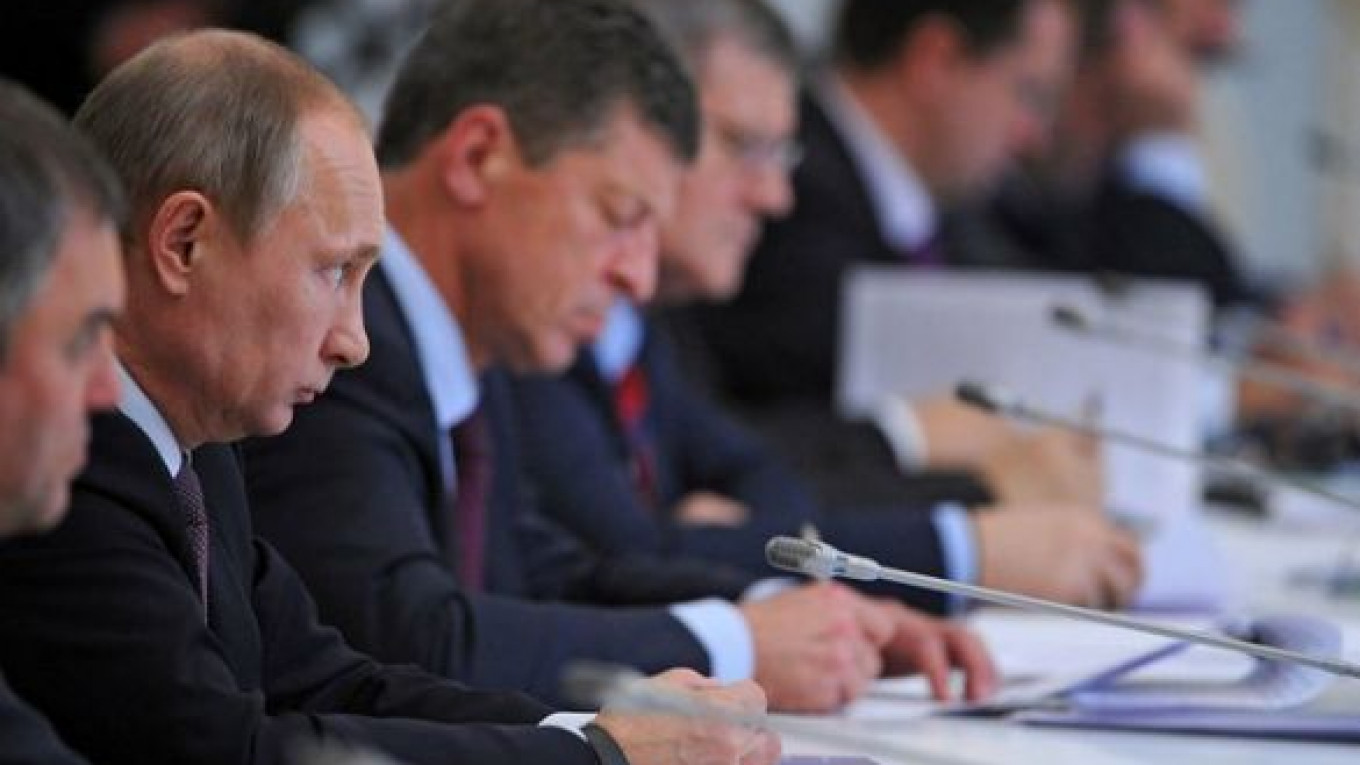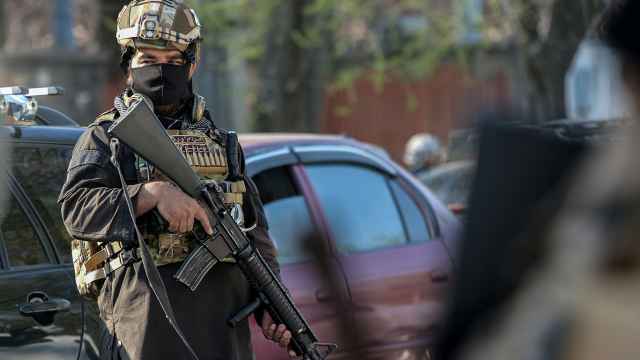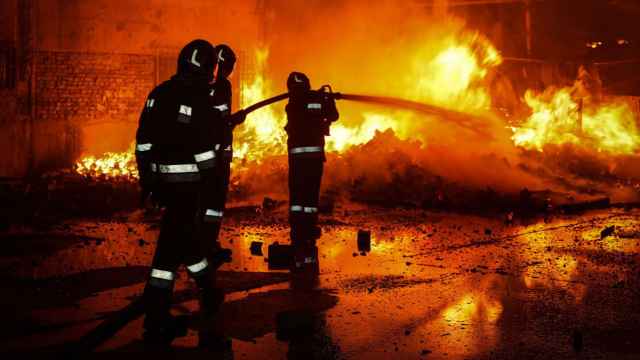Federal Migration Service head Konstantin Romodanovsky on Wednesday proposed tougher measures to control illegal immigration but dismissed the idea of introducing visas for Central Asian and Caucasus countries, echoing earlier comments by President Vladimir Putin.
The issue of immigration has been in the spotlight since it was heavily exploited by candidates in the Sept. 8 mayoral election. It gained further attention after thousands of people rioted in the Biryulyovo neighborhood of southern Moscow, attacking immigrants in the area, to protest a killing that police suspect was committed by an Azeri citizen. In the wake of the riot, several minor but violent protests have also taken place in Moscow and St. Petersburg, with cars being tipped over and migrants assaulted.
Some observers have linked the backlash against immigration to growing xenophobia, while others have argued that it is due to increasing disaffection with crimes committed by migrants and corruption schemes used to cover up illegal immigration.
Speaking at a State Duma meeting Wednesday, Romodanovsky suggested introducing criminal penalties for businesses that illegally hire immigrants instead of only fines. He said that by the end of the year, the government would submit to parliament proposals on improving the quota system for migrant workers.
Romadanovsky also said the Russian Security Council would consider next month the creation of detention centers for illegal immigrants. Most Russian regions were initially expected to open such centers by Jan. 1, 2014, but the process will be postponed because many regions are "physically incapable" of abiding by the deadline, he said.
Despite the tough talk on illegal immigration, Romodanovsky said introducing visas with Central Asia, a major source of migrants, would not be feasible.
"As for a visa regime, which is discussed so often now, I believe this approach is not promising," Romodanovsky said, Interfax reported. "The consequences of [tightly controlled] borders for foreign policy and the economy are even impossible to imagine."
Putin also criticized the proposal on Tuesday, saying the introduction of visas would not solve any problems because of pervasive corruption, which would allow migrants to bypass visa restrictions.
"The question is whether it will be better if we introduce [a visa regime]," Putin said at a meeting of the presidential council for inter-ethnic relations in Ufa. "Because the corruption that we have discussed here will be transferred from street markets to the border."
Dmitry Oreshkin, a political analyst and head of the Merkator research group, said proposals on introducing visas with Central Asia clashed with Putin's efforts to extend Russian influence to former Soviet countries.
Oreshkin also argued that the idea was popular among the masses but irrational from an economic standpoint. Economic growth results in higher demand for workers, and Russia will be unable to sustain that growth without migrant labor, he said.
At least 12 percent of Russia's gross domestic product is produced by immigrants, Oreshkin said, adding that if the shadow economy is taken into account then the figure is even bigger.
Journalist and writer Yulia Latynina, a vocal proponent of stricter immigration controls for Russia, has disputed the idea that there would be shortage of workers if fewer migrants were allowed over the border. On her weekly show on radio Ekho Moskvy, she has called the assertion that only Central Asian migrants would be willing to work as street cleaners and in similar positions a "myth," saying these jobs are filled by Russians in many cities.
The idea to introduce visas with former Soviet countries gained traction after opposition leader Alexei Navalny launched a campaign after the Biryulyovo riot to collect signatures for a petition demanding that the Duma consider a bill mandating visas with Central Asian and Caucasus countries.
The initiative triggered a spat between Navalny and billionaire politician Mikhail Prokhorov on Monday, when the latter called the proposal "nonsense" due to Russia's porous and unprotected border. He argued that the measure would only result in more illegal immigration and crime.
Navalny responded by posting links to Interfax reports saying Prokhorov himself had proposed introducing visas with Central Asia at least twice — in February 2012 and June 2013.
Apart from addressing immigration and the visa regime, Wednesday's Duma meeting was devoted to the riot in Biryulyovo. Interior Minister Vladimir Kolokoltsev said police had found about 2,000 apartments in the neighborhood, which were illegally rented by immigrants.
Putin also commented on Biryulyovo on Tuesday, saying local authorities were to blame for the unrest.
"In Biryulyovo, for instance, residents' disaffection has been building up for years, complaints have been filed with police, the district board and [the southern administrative] district's authorities," he said. "What is the point in authorities that do not want to know the situation on the ground, do not take any measures and do not listen to people?"
A Moscow court has upheld migration authorities' decision to fine fast-food giant McDonald's for employing an illegal immigrant without a work permit.
The Moscow District Federal Commercial Court on Wednesday dismissed a cassation appeal filed by the company in September.
The Federal Migration Service's Moscow Department inspected the fast-food chain Jan. 22 to check its compliance with migration law.
The inspectors established that the chain had hired a woman from Kyrgyzstan who did not have a work permit and imposed a fine on the company. According to the law on the legal status of foreign nationals in Russia, employers are only allowed to hire foreigners who have work permits.
The court rejected the company's arguments that it was not culpable because the woman had shown documents in another person's name when she applied for the job. (RIA Novosti)
Contact the author at o.sukhov@imedia.ru
A Message from The Moscow Times:
Dear readers,
We are facing unprecedented challenges. Russia's Prosecutor General's Office has designated The Moscow Times as an "undesirable" organization, criminalizing our work and putting our staff at risk of prosecution. This follows our earlier unjust labeling as a "foreign agent."
These actions are direct attempts to silence independent journalism in Russia. The authorities claim our work "discredits the decisions of the Russian leadership." We see things differently: we strive to provide accurate, unbiased reporting on Russia.
We, the journalists of The Moscow Times, refuse to be silenced. But to continue our work, we need your help.
Your support, no matter how small, makes a world of difference. If you can, please support us monthly starting from just $2. It's quick to set up, and every contribution makes a significant impact.
By supporting The Moscow Times, you're defending open, independent journalism in the face of repression. Thank you for standing with us.
Remind me later.






